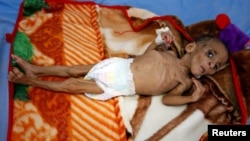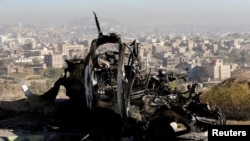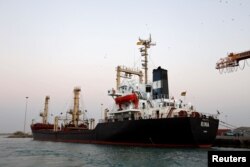“We have passed the grim milestone of 1,000 days of war in Yemen,” begins a joint statement from the World Health Program, the World Food Program and UNICEF, appealing for humanitarian access and an end to the conflict.
“The conflict in Yemen has created the worst humanitarian crisis in the world, a crisis which has engulfed the entire country,” the groups said.
About 75 percent of Yemen’s population is in need of humanitarian assistance, the statement said, including 11.3 million children who cannot survive without it. At least 60 percent of Yemenis don't have enough to eat, and 16 million people do not have safe water and proper sanitation. Many more lack can't get basic health services.
The unrest in Yemen has been ongoing since 2015 between the supporters of the internationally recognized government of President Abdrabbuh Mansour Hadi and the Houthi rebels.
Stalemate
With a Saudi-led Arab coalition backing President Hadi, and Iran supporting the Houthi rebels, the brutal conflict has stood at a stalemate, leaving thousands killed and injured, and leading to a humanitarian crisis that the United Nations has called the world’s worst.
Meanwhile, the al-Qaida branch in Yemen, more commonly known as al-Qaida in the Arabian Peninsula (AQAP), and its rival, IS, have exploited the turmoil to establish safe havens in the south and carry out deadly attacks throughout the country.
The statement from the three United Nations organization said the “horrific tally of the conflict’s devastation reflects only what we know. In reality, the situation is likely to be worse. U.N. agencies do not have full humanitarian access to some of the hardest hit communities. In many, we cannot even assess their needs.
“But this we do know: Yemen has passed the tipping point into a rapid decline from crisis to deepening catastrophe.”
Some progress
The international agencies, however, said there has been “some progress” recently with the arrival of the first commercial fuel imports into Hudaydah port, following recent commercial food imports.
“It is critical that these supplies are maintained, as restrictions on fuel imports have caused the price of diesel fuel to double, threatening access to safe water and sanitation, and urgent medical care,” the statement said.
The agencies say that while delivering humanitarian assistance has been difficult, the groups have persevered.
“We have reached nearly 6 million people with clean water, distributed 3.7 million liters of fuel to public hospitals, treated more than 167,000 children for severe acute malnutrition, delivered more than 2,700 metric tons of medicines and medical supplies and vaccinated 4.8 million children against polio, and delivered food assistance to around 7 million people a month.”
The U.N. organizations warned, however, that “if we cannot gain greater access and the violence does not subside, the cost in lives will be incalculable.”






